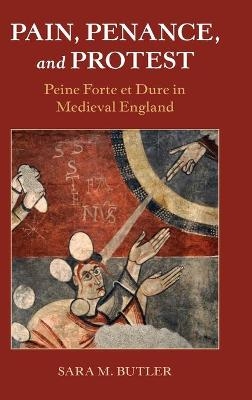
Pain, Penance, and Protest
Peine Forte et Dure in Medieval England
Seiten
2021
Cambridge University Press (Verlag)
978-1-316-51238-8 (ISBN)
Cambridge University Press (Verlag)
978-1-316-51238-8 (ISBN)
In medieval England, a defendant who refused to plead to a criminal indictment was sentenced to peine forte et dure – pressing with weights. Using this punishment as a lens, this book blurs the lines between law, religion, and literature to understand how it functioned within the medieval criminal justice system.
In medieval England, a defendant who refused to plead to a criminal indictment was sentenced to pressing with weights as a coercive measure. Using peine forte et dure ('strong and hard punishment') as a lens through which to analyse the law and its relationship with Christianity, Butler asks: where do we draw the line between punishment and penance? And, how can pain function as a vehicle for redemption within the common law? Adopting a multidisciplinary approach, this book embraces both law and literature. When Christ is on trial before Herod, he refused to plead, his silence signalling denial of the court's authority. England's discontented subjects, from hungry peasant to even King Charles I himself, stood mute before the courts in protest. Bringing together penance, pain and protest, Butler breaks down the mythology surrounding peine forte et dure and examines how it functioned within the medieval criminal justice system.
In medieval England, a defendant who refused to plead to a criminal indictment was sentenced to pressing with weights as a coercive measure. Using peine forte et dure ('strong and hard punishment') as a lens through which to analyse the law and its relationship with Christianity, Butler asks: where do we draw the line between punishment and penance? And, how can pain function as a vehicle for redemption within the common law? Adopting a multidisciplinary approach, this book embraces both law and literature. When Christ is on trial before Herod, he refused to plead, his silence signalling denial of the court's authority. England's discontented subjects, from hungry peasant to even King Charles I himself, stood mute before the courts in protest. Bringing together penance, pain and protest, Butler breaks down the mythology surrounding peine forte et dure and examines how it functioned within the medieval criminal justice system.
Sara M. Butler is the King George III Professor in British History at the Ohio State University. She is the author of three books: The Language of Abuse: Marital Violence in Later Medieval England, Divorce in Medieval England: From One to Two Persons in Law, and Forensic Medicine and Death Investigation in Medieval England.
Introduction; 1. Peine Forte et Dure: the medieval practice; 2. Standing mute in the courts of medieval England; 3. Due process and consent to jury trial; 4. Peine as Barbarity? putting the practice in context; 5. Why stand mute?; 6. Standing mute as Imitatio Christi; 7. Rejecting the jury, rejecting the common law, rejecting the king; Conclusion; Works cited; Index.
| Erscheinungsdatum | 10.11.2021 |
|---|---|
| Reihe/Serie | Studies in Legal History |
| Zusatzinfo | Worked examples or Exercises |
| Verlagsort | Cambridge |
| Sprache | englisch |
| Maße | 158 x 236 mm |
| Gewicht | 880 g |
| Themenwelt | Geschichte ► Allgemeine Geschichte ► Mittelalter |
| Geisteswissenschaften ► Geschichte ► Regional- / Ländergeschichte | |
| Geschichte ► Teilgebiete der Geschichte ► Militärgeschichte | |
| Recht / Steuern ► Rechtsgeschichte | |
| ISBN-10 | 1-316-51238-X / 131651238X |
| ISBN-13 | 978-1-316-51238-8 / 9781316512388 |
| Zustand | Neuware |
| Haben Sie eine Frage zum Produkt? |
Mehr entdecken
aus dem Bereich
aus dem Bereich
eine neue Geschichte des Mittelalters
Buch | Hardcover (2023)
C.H.Beck (Verlag)
CHF 53,20


